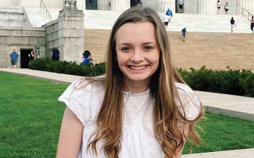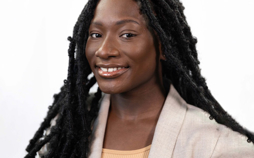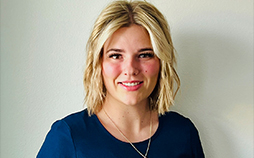Shaping Public Opinion
For political science student Kesley Powell, many of the most important experiences of her BYU career weren’t in a classroom.
November 2024

Every other intern in the Washington, DC, office was a local third-year law student. “They were amazed at the opportunities and support I had,” says Joshua DeLaigle, a BYU undergraduate political science student, ROTC cadet, and future Judge Advocate General (JAG) officer.
“BYU professors care about their students, and they show it by their actions,” DeLaigle says. “I’ve had great experiences here. The professors are great, and the university is well connected around the world. And these advantages lead to unique learning opportunities.”
As a teenager, DeLaigle would tell his mom that he was going to join the army, and she would teasingly reply, “You know you don’t want to do that.” But it was a kind of foregone conclusion—DeLaigle is a fourth-generation member of the US Army.
His parents strongly supported his desire to go to college, but before that, DeLaigle wanted to go on a mission. He was called to serve in Chile, where he learned to speak Spanish. Working in the mission office, DeLaigle coordinated with the Chilean government in Spanish about missionaries’ visas.
These experiences and interests came together when he came to BYU. During the winter semester of his junior year, DeLaigle wanted to intern at the US Department of Justice in the Criminal Division’s Narcotics and Dangerous Drugs Section (NDDS). “I applied, not really thinking I would get it because there is a small number of internships available and a large pool of applicants,” he says.
DeLaigle was surprised to hear back quickly. “When I told them that I was fluent in Spanish and had experience communicating legal terms in Spanish, that kind of sealed the deal.” He was ecstatic, but then he realized that he didn’t have the financial resources needed to live in Washington, DC, as an unpaid intern.
As a first-generation college student, DeLaigle has learned how to seek out available resources, so he spoke with internship coordinator Lisa Peck in the College of Family, Home, and Social Sciences. He told her about the NDDS internship offer and how he would probably have to pass on it due to a lack of funds.
Peck told him about Washington Seminar and the Barlow Center. Most seminar students live in the Barlow Center while interning in the DC area. It is conveniently located in the Foggy Bottom neighborhood and provides students, including married students, with affordable housing. Also, thanks to generous benefactors, students may be eligible for grants to support them during their internships. These grants are especially helpful for students with unpaid internships.
Peck says that helping students access meaningful experiential learning opportunities is important to the college. “We are constantly evaluating how to assist as many students as we can,” she says.
DeLaigle and his wife, Holly, spent the summer in Washington, DC, at the Barlow Center. While she studied for her nursing licensing exam, he interned at NDDS. “It was amazing,” he says. “Because I speak Spanish, they had me do a lot of evidence translation. I got to work not only with the prosecutors but also with FBI and DEA agents, and I sat in on interviews with suspects.”
DeLaigle plans to graduate with a degree in political science, be commissioned as a second lieutenant in the US Army, delay service to go to law school, pass the bar, and then be an active-duty JAG.
“I want the donors who helped me to know that they made my dream come true,” DeLaigle says. “I am truly grateful.”

For political science student Kesley Powell, many of the most important experiences of her BYU career weren’t in a classroom.

Your donations to the College of Family, Home, and Social Sciences help make a difference for students like Abena, Rachel, Alyssa, and Luca.

“My professors continually connect the material of their classes to the gospel,” Lynsie Huff says of her experience at BYU.